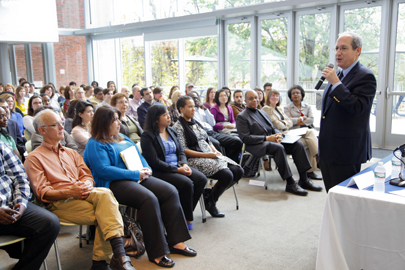Forum highlights Heller’s focus on achieving diversity, equity
 Photos/Mike Lovett
Photos/Mike Lovett“Our goal is to make the Heller School, with its rich programmatic offerings, its history of contributions to the fields of policy and management, its broad geographic, class, racial, religious and ethnic representation, a model of global and domestic diversity and equity,” Lynch explained.
President Frederick M. Lawrence, professors Anita Hill and Ted Johnson, and Heller PhD candidates Callie Watkins Liu and Phomdaen Souvanna, shared their insights on diversity, and barriers to inclusiveness. Michelle Scichilone, assistant vice president of human resources, described Brandeis’ efforts to make its policies more equitable for employees with same-sex partners.
President Lawrence, who discussed several Supreme Court cases involving diversity — same-sex marriage, the Voting Rights Act and affirmative action — said Brandeis made a commitment to enhancing equity and access to admissions in 1968.
In the aftermath of Rev. Martin Luther King, Jr.’s assassination, Brandeis established the Transitional Year Program (now called the Myra Kraft Transitional Year Program) to encourage academically promising students from diverse backgrounds to apply to Brandeis, and to provide them with institutional support to help them be successful. “Does Brandeis have an obligation to help people succeed once they are here?” Lawrence asked. “We do. It may not be a legal obligation, but it is a moral obligation.”
Hill said while legal action has been important in making diversity a reality, it isn’t sufficient. “We have to support our ideas of inclusion and diversity, and it is not just about our social justice mission. It is about completing our mission to be an academically excellent institution.”
Johnson explained that awareness, accessibility and attention are key to promoting diversity of thought and experiences. A key element to support diversity of thought and voice in the classroom is raising awareness about the impact of microaggressions — brief verbal or behavioral interactions that convey hostility, said Watkins Liu and Souvanna. Microaggressions may be viewed as trivial by some, so they often go unchecked, but they can be a constant for marginalized individuals, and may result in adverse self-esteem, physical and emotional issues.
Lynch outlined five objectives for the school to help Heller meet its commitment to achieving diversity and equity:
- The Heller School will ensure that diversity and inclusion are embedded in the classroom experiences through civil dialogue, and that cultural competency and awareness of history are basic to each student’s learning.
- Heller will increase faculty capacity to educate students about diversity and develop inclusive learning environments.
- Heller programs will equip students with diversity-related expertise as appropriate to each degree.
- Heller will develop innovative co-curricular, internship and research experiences to promote students’ ability to work and live in diverse communities.
- Heller will develop and support nationally recognized research and scholarship on race, ethnicity, class, gender, and other dimensions of diversity.
Categories: General, Student Life





